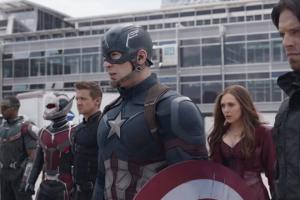Captain America sequel makes up for 'Batman v. Superman'
Anyone who stridently defended that massive cinematic landfill known as “Batman v. Superman” should immediately head into “Captain America: Civil War” and see exactly why so many critics were quick to dump on your bloated film.
It’s not that we don’t “get” superhero films, we just don’t like ones that suck. “Civil War” tackles the very same central theme as “BvS” (the innocent people affected by the city-toppling destruction when a team of superheroes goes into battle), but demonstrates a chemist’s precision in mixing just the right elements.
It also shoulders one of the largest character lists of any Marvel film thus far, essentially acting as a de facto sequel to 2012’s “The Avengers.” In fact, you could call “Civil War” “The Avengers: Sorry About that Whole Ultron Mess.”
Captain America, aka Steve Rogers (played by Chris Evans) opens the film by leading fellow Avengers Natasha Romanoff/Black Widow (played by Scarlett Johansson), Wanda Maximoff/Scarlet Witch (played by Elizabeth Olsen), and Sam Wilson/The Falcon (played by Anthony Mackie) on a fairly standard Avengers-like mission in Lagos.
In an attempt to save Cap, Scarlet Witch deploys her telekinetic glowy-ness, which accidently roasts a number of visiting peace workers. Having happened so closely to the last world-saving efforts that essentially brought an entire city to rubble, bad publicity abounds for our heroes. The Avengers are asked to sign a U.N. agreement that would hamstring their abilities, which would only be sanctioned by the governing body. Tony Stark/Iron Man (played by Robert Downey Jr.) views the deal as one that could only help make them stronger, but also ensure fewer casualties in their next outing.
He is joined by Lt. James Rhodes/War Machine (played by Don Cheadle) and Vision (played by Paul Bettany), who also view the accord as one that could benefit society. Captain America, on the other hand, views the agreement as one that will shackle the team when it comes time for immediate response and provide them with less autonomy than they now typically enjoy.
When Rogers’ old pal Bucky Buchanan, aka The Winter Soldier, pops back into the picture, the chasm between Captain America and Iron Man broadens. Also, a host of other Avengers arrive on screen to take sides. Paul Rudd returns with necessary comic relief as Ant-Man, Chadwick Boseman makes a noticeable introduction as Black Panther, and (yet another) Spider Man enters the fold, this time played by Tom Holland.
And while Spidey enters late in the picture, his screentime here is perhaps more entertaining than in the last three overblown “Spider Man” films combined. This feels very much like an “Avengers” film, though it is obvious that the talented Russo Brothers (who directed the first two “Captain America” films) are perhaps the consistently strongest filmmakers within the Marvel universe. Dispensing with much of the pyrotechnic glitter and special effects confetti that can mark such potential blockbusters, they instead keep action close and tight, and screenwriters Christopher Markus and Stephen McFeely’s script straddles the distinction of hero versus vigilante.
It is precisely this type of nuance that makes for such a stronger superhero film (and franchise). It should be noted that the film has a welcome relief valve of humor throughout that pulls us back when things seem to get too bleak.
“Civil War” provides characters that, when pitted against one another, elicit compassion from us as to what they are fighting for, and then films a climactic battle that we are actually able to follow and understand (while still being frenetically filmed). At 2.5 hours, it does feel as though there there is more than is needed with “Civil War,” but with all it had to accomplish narratively, this can be forgiven.
Along with “Winter Soldier,” “Civil War” cements the “Captain America” franchise as perhaps the most solidly dependable, and judging from the rousing response from the crowd at my screening, future installments will be eagerly awaited.

















































